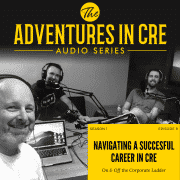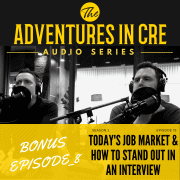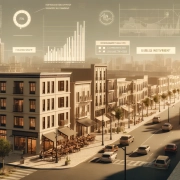Launching a Co-Living Company Amidst a Global Pandemic with Johannes Peter
In this episode of the A.CRE Audio Series, we’re pleased to be joined by Johannes Peter, the Founder & CEO of TomoDomo Co-Living in Switzerland. Through Co-Living, TomoDomo’s goal is for their residents to consciously share their living space in order to build relationships, think further, aim higher and live better. This episode discusses how to accomplish this amidst a global pandemic.
We’re very grateful for Johannes’s willingness to share his knowledge with the A.CRE audience!
Launching a Co-Living Company Amidst a Global Pandemic with Johannes Peter
Watch as Spencer, Sam, Michael, and Johannes Peter discuss co-living during a global pandemic.
Or Listen to this Episode
Resources from this Episode
Episode Transcript
Announcer (00:01):
Welcome to the adventures and CRE Audio Series. Join Michael Belasco and Spencer Burton, as they pull back the curtain on everything commercial real estate, and introduce you to some of the top minds in the industry. If you want to take your skills to the next level and be part of a growing community of CRE professionals across the world, this is for you.
Sam Carlson (00:23):
Hello, and welcome back to the A.CRE Podcast. It’s good to be back. We love to do these. Obviously, we love to do them in person, but we’ve got the next best thing because today, Michael Spencer and I are joined by guests. Johannes Peter. Johannes how are you doing buddy?
Johannes Peter (00:38):
Doing great.
Sam Carlson (00:40):
You are with us today from across the pond, correct?
Johannes Peter (00:44):
That’s right. Right here from Zurich.
Sam Carlson (00:46):
That’s amazing.
Johannes Peter (00:47):
Switzerland.
Sam Carlson (00:48):
Well, that’s amazing. That’s very cool. So, we’re excited to speak with you today. We’re talking about launching a Co-Living company in the midst of a pandemic. And so this is going to be a really fun interview and to kick things off, I’m going to turn it over to Michael Belasco.
Johannes Peter (01:03):
Yeah. Thank you, Sam.
Michael Belasco (01:06):
Yeah, I’m really excited about today. We have Johannes here. Who Johaness and I go back about four or five years, I think to San Francisco. We were both working there at the time. And we met, I believe it was at a NAIOP event, which then turned into a extraordinarily late night if I recall correctly. And then we became friends ever since. Johannes was there developing. I was in San Francisco developing as well. What’s really exciting is his entrepreneurial spirit ended up taking over and he ended up launching this really exciting Co-Living company in the midst of a pandemic as the title. Actually, I’m going to stop. I’d like to kick it over to Johannes first. Give a little bit of his background. We’ll talk a little bit about him and then we will go into the story of actually launching within the pandemic. And we’ll talk a little bit about what it takes to start a company, whether within a pandemic or even the outside of a pandemic.
Michael Belasco (02:05):
So, let me kick it over to you. Johannes and please give an introduction and we will start to ask you, I’m sure we all have a ton of great questions that we’d like to ask you. So, please take it away. Give us a little bit of your background.
Johannes Peter (02:17):
Sure. Thank you, Michael. And I’m super excited to be here today. I remember when we met, I was pretty much fresh off the boat coming from Switzerland and being super excited about starting a new job in San Francisco. What got me there really was I was working in Switzerland for a real estate investment fund investing in Asia, and we were doing a bunch of projects in China and Indonesia. So, I was traveling a little back and forth to Asia and working on these projects and also living in China actually for a while. So, I was very much into international real estate because, I always felt that Switzerland is a small place and everything is super neat. Everything is well organized, but there is not that many projects going on, not that many big projects at least.
Johannes Peter (03:13):
So, when I went to Asia, I was blown away just by the scale of how things are developing over there. After a few years, my wife started a company in Switzerland and moved that company then to the U.S. to San Francisco. So, I was visiting San Francisco. I think it was 2015 for the ULI conference, that was happening in San Francisco back then. So, got introduced to the whole real estate community. And to me it was something totally new because, Switzerland has your life and it’s way smaller and being able to go there, and meeting all these great people from all of U.S. coming to San Francisco to talk about real estate. For me, it was a really great experience.
Johannes Peter (04:03):
I then decided basically to one, marry my wife and two move to San Francisco. So, I proposed actually to her under the Golden Gate Bridge a few months later and then moved to San Francisco without a job back then. Then, started looking around because, I had a good feeling about finding a job. So, I started looking around and actually landed a job with a real estate developer in San Francisco. Then, started working on a project. A development project down in Monterey. Big residential neighborhood development, which was super fun. And that’s how things led up to when we met. And of course I was super into all of these networking events that you align NAIOP, and getting to know you, getting to know other people in the field. And that was really a stimulating experience for me to broaden my network from my knowledge in real estate. Eventually, also bringing me to the point where I am today of starting my own company and doing all of that.
Michael Belasco (05:12):
Yeah. So, walk us through a little bit of that transition. When I left, you were back in San Fran… I think I left before you. First, what launched the idea of TomoDomo? And what gave you the courage to proceed through it, especially in the midst of the pandemic. So, give us a little bit about your thinking about how you launched it and then decided to pursue it even through the insert.
Johannes Peter (05:38):
So, the idea of TomoDomo, is really the idea of building communities and having lived as an expat in San Francisco, but before that also in China. Coming to a new city as a foreigner is always a very special time. Everything is super exciting and everything is new. Everything is big and you have all these great things to explore but, it’s also a time where you really seeking connection and you seeking a new network. And that’s also why basically we met through ULI and everything. So, you want to be part of the community and you’re looking for people that you can connect and exchange ideas. And what happened with me was, my wife and I, we were living together in a small apartment in San Francisco. Very small and way too expensive rent. I see you certainly made the same experience. What we then decided to do after one year living that way was that, we gathered our friends and said, “Hey, let’s all move into a big house in San Francisco.” And that’s what we did.
Johannes Peter (06:54):
It was a nice place in Portrero. Big rooftop terrace. What then happened was it developed as a focal point for all our friends to gather, and meet there and hang out and do things over the weekend, like barbecues and parties and movie nights and all of those great things. For me, that was a really good experience because it allowed me to even broad my network further and have a really good time and fulfilling time in San Francisco. When you live with your partner, there is a tendency to really focus on each other and not being so available anymore for other people. When you live in a community, then you get the best of both worlds where you can cherish your relationship to your partner, but you also have people around and you cannot live a very… You are living in a connected life.
Michael Belasco (08:00):
My experience was like firsthand for you. You were in it.
Johannes Peter (08:04):
Yeah. What happened then was that we were there for three years in San Francisco and I thought about, “Okay lets…” Eventually, you want to be in Switzerland and start a family here. So, it was time about thinking of what to do next in Switzerland. Then, I joined the young leaders group of NAIOP?
Michael Belasco (08:29):
Yap.
Johannes Peter (08:31):
So, I tried that program and I was a little bit late to do it because, I wasn’t sure how long I was still staying in San Francisco, but I decided to go for it anyway. And what happened there was, it was a really great group of people. We did a bunch of workshops. You probably been part of before. Where you talk a lot about, what you actually want to do and what do you want to achieve.
Johannes Peter (08:58):
For me, I was there, I was like, “Wow, this is great opportunity to me. Think about it. Okay, what should be the next step?” And that’s where I developed the idea of starting my own company and also find the courage really to do it because, that’s one of the biggest point that really holds you back often. Is not having the courage to just go for it. So, doing the NAIOP program and being surrounded by supportive people who just encourage you to just go for it. For me, it was great. So, then I moved back to Switzerland. I was like, “Wow. I’m super stoked. I want to go for it. I want to start this company.” That was back in March, last year. The pandemic at that time… It really dawned on people then that this is a serious thing because, that’s when middle of March, just when the lockdown started in Switzerland and in many other places in the world.
Johannes Peter (10:06):
That was the moment a lot of people realized, wow, this is much more severe than we all thought it’s going to be. And for me, it was also a devastating moment because, I had all these ideas of, Oh great, I have my real estate contacts. I’m going to beat you out to them and talk to them. I lined up all these meetings and I had one building in Zurich where I already talked to the owner and he said, “Okay, let’s look into this and how we can turn this to multi-family building like 14 units as 14 units residential. And how we can turn this into a large community house.”
Johannes Peter (10:47):
And then I called him and he was like, “I really don’t have time for this project right now. We have all our retail properties, we need to renegotiate with them about leases and there’s all these things going on. So we have to put this thing on hold for the moment.” And I was like, “Okay, that’s not cool.” Other meetings that I have lined up, people said, “okay, yeah, we have to do all the things right now then talk about Co-Living.”
Michael Belasco (11:21):
Wow. You had already gone public with the company at that point or? Because I remember reaching out to you in the midst of it, wanting to know how it was going and seeing if you wanted to speak to us here, going through COVID. And you were like, “I don’t know if I can even get on yet.” You weren’t even sure. The uncertainty around it was insane. I remember you falling up. I’m not [crosstalk 00:11:41] So, yes. Speak that a little bit more.
Johannes Peter (11:46):
Yeah. Because of the pandemic, I had a lot of time to think about what should be the next steps. I was reaching out to a bunch of people figuring out, Okay, what could be an opportunity now? And so my uncle, he actually runs a hotel here in Zurich. I talked to him and he’s like “You should really look into city hotels right now because they of course have very little occupancy and they might think about how they could manage their properties going forward because, this might take much longer than we all thought it would.” So, I started reaching out to all the hotel owners in Basel and Zurich, which are the main towns here in Switzerland. And wrote them a nice letter saying, “Hey, I have this Co-Living idea.” And a very simple calculation on… If you get 60% occupancy in a hotel, you have almost the same revenue or net revenue as with Co-Living model because, operating costs with Co-Living are much lower.
Johannes Peter (12:58):
Of course, revenues is also lower, but operating costs is also much lower. So, if your hotel runs with less than 60% occupancy, that might be a feasible model for you. And then I got very little response because I didn’t have much to show for. I had some nice pictures and stuff but that was it. But two people got back to me and one of them turned out to be a large hotel owner here in Switzerland. And he really liked the idea because, he was already re-positioning his portfolio, two boards, more like service departments, corporate housing and things like that. Just to be a little bit more balanced. And he as many others like people who work in hospitality, was very much into building communities, building places where people can connect. Because if you talk to the teller, that’s really what they thrive on.
Johannes Peter (13:56):
They thrive on the interaction with people, with their guests. They often don’t want to build these big complexes where people just go in and out. They love the bar. They love the entry area. That’s where people mingle, that’s where they can have interaction. And so to them, the idea of Co-Living actually was something they can relate to because, Co-Living in a sense, is very similar to about like building places where people can interact and thrive.
Johannes Peter (14:32):
Also, it’s about hospitality, it’s about good design. So many similarities actually to the hotel industry. And then the other part of course, is that hotels basically have the perfect floor plan for Co-Living conversions because, if you take a hotel room, especially a little bit better hotels, they have pretty large rooms in square foot, that’s for 250, 300 square foot room. Sometimes you can find it here in the city. They have nice bathrooms, but they don’t have a kitchen of course. So, you cannot really live there without a kitchen but, Co-Living solves that problem. For my first project, we just took one status floor, 20 rooms. We combined two of the rooms for one large kitchen and put in nice furnishings. I’m a structural engineer by training. So, I really love to take out the wall [crosstalk 00:15:35]
Michael Belasco (15:34):
So, you are a structural engineer?
Johannes Peter (15:38):
Yeah.
Spencer Burton (15:44):
So, this is fascinating Johannes. I’m loving this. Talk to us a little bit about the business plan, right? So, we’re all real estate people here and those who are listening also are. What’s the business plan look like at least for your Co-Living? You don’t have to give away all the secrets but, how did this things pencil? How do they work? And then a follow-up question to that would be, what are some challenges of the business plan that you’re discovering?
Johannes Peter (16:14):
So, with the hotel conversions, the main thing really is, okay, how much revenue can you generate with the Co-Living model? So, in Switzerland, rents are not as high as San Francisco, but it goes towards that direction. U.S. dollars, Swiss Franc is pretty much the same. So, you get around 1500 Swiss Franc, U.S. dollar per month for A studio here in Zurich. And that is also the price that I’m targeting for Co-Living. So, that is around 50 U.S. per night. That is of course, much lower than what you would get for a hotel here in Zurich. Average rent are, will be somewhere around 100 to 150 Franc. So, of course that’s what I’m talking about. Reducing your revenue stream with the Co-Living month. Now, when you only have 50% occupancy and your average room rate is 100, with 50% that drops down to 50.
Johannes Peter (17:31):
So, on the revenue level, you’re already the same, more or less the same as Co-Living with 50%. And then the operating cost of the hotel is of course, much, much higher than what you have with Co-Living because, like hotel, you have to room cleaning, you have staff with reception and all kinds of things. And with Co-Living those operating costs are much lower because, you don’t have any staff on site.
Johannes Peter (18:00):
Now, the way I structured those deals really depends a little bit on the owner. There is of course in Co-Living, two models. One is the master lease model, where I went to the whole building from beyond and the other one is the management model where I just manage it. The risk remains with the owner. Now here, what I’ve done is, I structured deals that are a mix of both because, in Switzerland, they’re very familiar to the master lease, but not really to the management model. So, these hybrid models really allow me to pay adequate rent to the owner, kind of low rent. And then we share part of the revenue. So, that he gets really to the same or better revenue or net revenue than what you would have if he had like 50, 60% of consumers.
Spencer Burton (18:59):
Got it. So, what was the difference then between Co-Living and an apartment? I mean, obviously there’s Co-Living spaces, but let me talk through us in specificity. So, you converted two rooms to a kitchen. Is there shared cooking amongst the residents or does each resident uses the kitchen as they need it? What challenges do you have there? I mean, what if the kitchen is being used by someone else? What if someone’s especially messy and always leaves the kitchen dirty. So, do you have cleaning staff? Talk to us about operation for something like this.
Johannes Peter (19:40):
Yeah. It’s interesting because, this hotel, the first one we converted, it has 38 rooms and we have 40 people living there, but there is only two kitchens. So, you have 20 people sharing one kitchen and then you might think, wow, this is going to be a mess. This is like the student dorm on steroids. This is not good. This cannot work. But what happens is that the target group of Co-Living is much older than students also we specifically target a little bit older demographic, like twenties, more like thirties. And in that age group people they’re working, they know how to run a household. They like a clean environment, and it works really well with that kind of demographic because, also the way I set it up is really… I try to attract people who want to live in a community that is kind of the premise you want to be part of that.
Johannes Peter (20:56):
It’s not something that you just go there because the rent is cheap or you don’t find anything else. I try to discourage people who come with that motivation. I say, “Hey, this is place where you want to share your living environment with others and you have to take care of that living in environment.” So, of course I provide services like professional cleaning of the common areas once a week. But if you behave like in a hotel, you have to clean every day after people. So, you have to hand over that responsibility to the inhabitants. You’re a part of this. And to make it work we need you too.
Spencer Burton (21:36):
So, the value proposition, what I’m hearing from you, the value proposition for the renter is they get community. So, rather than living alone… And especially, I can imagine right, you’re in your thirties, maybe you live with one other person or you live alone, but you’re at work all day long. And so this gives you a social element. Are there other value propositions to this? When you’re competing against an apartment, what does TomoDomo offer to a renter that an apartment doesn’t besides the social element?
Johannes Peter (22:10):
Yeah. So picture this, Switzerland is a very… I would say conservative place in the sense that it’s really hard to break into networks here. It’s not like San Francisco or New York where you can arrive and you meet immediately. Meet a bunch of people. And you have all these great resources. You align and other things where you can easily connect. Switzerland is more traditional in that way. And we speak our own language too. Swiss German is very different to German and English of course. But Zurich is a very international place. And there is many, many people coming from abroad. They come here. They work here for a couple of years and they don’t meet anyone. Sadly. And then after two years, they go back to their country and they’re like, “Hey, I had a really bad experience in Switzerland because these place is beautiful, it’s nice, but it’s really hard to get to know people there.
Johannes Peter (23:13):
That’s one of the main things I wanted to address with building these places. Building places where you can go to, and you can connect with people. Once you set the purpose, you find people who gather around that purpose. Then you go into that and it becomes super easy to connect and make friends and make connections. That’s one of the key value propositions. Now, there is a bunch of others too, which has of course… These rooms are furnished. So, if you arrive in Zurich, you don’t have to go to IKEA on where to furniture place. Thirdly, the rental market is super difficult in Switzerland. You have high barriers in the sense that you need to provide all kinds of documents, like reference letters from previous landlords saying that you can pay the rent. So, landlords are very hesitant to lease out a room to people that don’t have that proper track record. Although you might be working for Google, Apple, Facebook, who all have offices here.
Johannes Peter (24:29):
And then the fourth point is, the rental market in Switzerland’s very regulated in the sense that it’s not like in U.S. where you can just go up 5 cent each year. You don’t have these discussions with your landlord. In Switzerland, it’s all… You cannot increase the rent basically over here. So, what it does is, that the rooms are… Or the apartments, there’s many, many people applying for apartment like, 50, 60 people. And if you don’t have proper track record and everything, you just don’t get it.
Spencer Burton (25:13):
What about absorption? You live in the development world. You develop, and then you’ve got your lease up, period. How long does it take you to lease up one of your typical hotel conversions? And I know it depends on unit but, generally speaking, I mean, is this, a fast lease up? I’m comparing senior housing, which is a slow lease up in the United States but, once you’re full at lease, and they’re really sticky compared to a market rate apartment, that generally leases up fast, and you offer concessions or what have you. What’s the lease up like for this product type?
Johannes Peter (25:50):
So, I started marketing while I was doing construction at the same time. So, that was one month before opening. We had good pictures made of the rooms. We could really show the product but, we couldn’t show any of the common areas because, those were still on construction. So, I took those pictures. I went to social media channels and started posting. I basically leased out 75% of the rooms within that first month.
Michael Belasco (26:18):
Wow.
Johannes Peter (26:19):
So, at the day of the opening, I had 75% leased out. And every day I was doing six calls. People could book calls with me on my calendar, and everyday was doing six calls, just back to, back to back to back. [crosstalk 00:26:37].
Spencer Burton (26:38):
When did you open. When was the first opening?
Johannes Peter (26:41):
1st of October.
Michael Belasco (26:42):
Wow. Through COVID and all that. Then being able to go and check in were there other protocols in place? It sounds like there’s no other bylaws, are there anything that governs the way people live together or is it just you’re there and you work it out with each other? I mean, how does that all work?
Johannes Peter (27:00):
I found that actually an association, a member’s association that manages part of that organization stuff. So that, the association can have a bank account. People can pay into bank account. We can use that money to purchase stuff for the community like dishwasher and trash bags and whatnot. So, that was one part more organization. But then the other very important thing was building a sense of community. And what I did was we started with a workshop where we talked about the vision and values. Something actually I learned at the workshop at the NAIOP. [crosstalk 00:27:40]
Spencer Burton (27:46):
Who was in those workshops? Did you find-
Johannes Peter (27:48):
All the residents. Oh, so you did it after they got in there, you got all the residents together as a collective workshop, everybody wearing their masks and everything. I mean, it looks [crosstalk 00:27:56]. At that time, infection rates in Switzerland were very low. So, we had like a window where we had almost like five or 10 cases a day in Switzerland. So, the restrictions weren’t that tough. And we were able to do those kinds of things. Right now, that’s all stuff we cannot [inaudible 00:28:17] like events or anything like that anymore but, it was easy to do it in the beginning. Just to let people get to know each other. That kind of make sense of community can actually take off. Yeah.
Michael Belasco (28:28):
So, I want to bring it back a little bit. There’s a lot of people listening that are hearing your story and I’m sure they’re ambitious. They’re entrepreneurial. And I don’t know. I think we’re getting close to the end here. I’m curious if you have any words of wisdom for people that are willing and are building up the courage as you put it to then go out there and start their own thing. Do you have any big takeaways from that? And any advice you could provide? Putting you on the spot a little bit here, there isn’t it?-
Johannes Peter (29:00):
So, far I’ve been bootstrapping everything and what helped me a lot to do that was just staying very lean and frugal and not spending money on consultants. And spending money on people building your website or any of those things. Today, you have so many possibilities of doing all of that on your own. With great tools that are out there. Also, like marketing, you can go out there yourself, market your product on Facebook, on other channels, YouTube whatnot, and you can find your audience. We’ve never lived in a time where that was so easy to reach your customer. Also, to build a product by yourself. So to me, that was one of the key things really.
Spencer Burton (29:58):
So, you talked about courage at the very beginning of this. For a lot of us in the industry, we get comfortable in a cushy job at Heinz or portfolio manager for XYZ investment management firm. That individual has some entrepreneurial aspirations, but they’re comfortable. What would you tell that person who they’re thinking, should I, or should I leave this cushy job to live a frugal life and start something that may or may not work? What would you tell them Johannes?
Johannes Peter (30:32):
Keep the job. Don’t do it. It really depends on what do you want to do and what kind of things come up? I think there is a right time to start a company. For me, I needed the experience that I did before to do what I do today. Also, having worked in the U.S. gave me a lot of self-confidence, that then turned into like building my own company. There comes a time in life when you feel, wow, I see something, I see an opportunity. This is something I should pursue and listen to yourself.
Johannes Peter (31:33):
Then you will notice when that moment is here. And then, you go for it. I wouldn’t say… A lot of people are doing startups and doing all of that. It’s okay not to do a startup. Not everyone needs to do a startup but, when you feel the moment is here, and you see the opportunity and it lines up, then go for it. That’s I think the way to do it. Don’t feel pressured to start a company.
Spencer Burton (32:10):
I think you said one really thing… One of the notes I was taking here, something that I think is so true is, you said set a purpose and the people who align with that purpose will fall into place. So, this was an amazing episode. So Johannes, thank you so much for joining us here today. It’s been a lot of fun. And for everybody listening to the podcast today, thank you for coming. And we’ll see you on the next episode of the podcast.
Announcer (32:40):
Thanks for tuning into this episode of the adventures and CRE Audio Series. For short notes and additional resources, head over to www.adventuresandcre.com/audio series. Would you like to learn real estate financial modeling in a matter of weeks and do it with zero guesswork? If so, the A.CRE Accelerator is for you. The accelerator is a step-by-step case-based program designed to teach you exactly what you need to know, and in the order you need to know it. So, you can gain both the knowledge and experience to take your career to the next level. to see if the accelerator is right for you. Go to www.adventuresandcre.com/accelerator.








